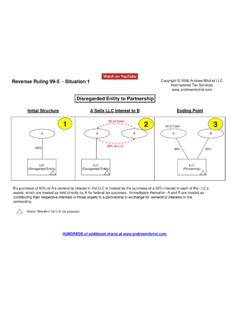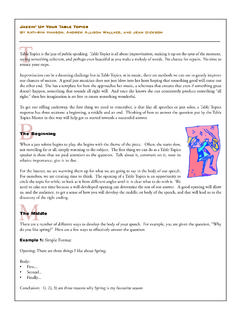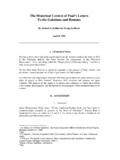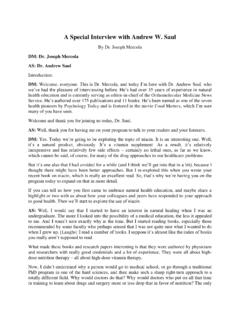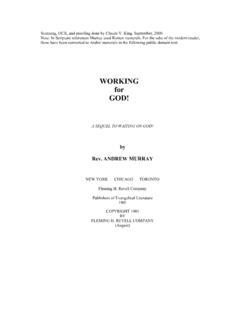Transcription of Legal Rights of Photographers - Andrew Kantor's Place
1 Legal Rights of Photographers v. 1 of 8 Andrew Kantor May 2009 Legal Rights of Photographers Version May 2009 By Andrew Kantor Even before 9/11, photography had been under siege. Anyone with a camera larger than a cell phone was considered some sort of threat, and since 9/11 it s only gotten worse. There s an incredible amount of misinformation about what Rights Photographers in the United States have. People have written to me about how they were told, You can t take pictures of police, and You can t shoot children without their parents permission and You can t take pictures on private property without permission. None of these are true. Photographers have been harassed, threatened, and killed all for capturing a moment on a memory card or on film. Images have been deleted or confiscated, police have been called, and innocent people have had to deal with know-nothing guards, cops, and ordinary folks.
2 In 2005, I was a newspaper reporter. Many of us carried point-and-shoot cameras, but our photo department couldn t give us definitive guidelines of what we could and couldn t legally shoot. So I set out to learn. I read, sent e-mail, and made phone calls until I was satisfied. (My list of sources is at the end.) It didn t take long for a clear consensus to emerge, from people who know these things, about what s Legal and what s not. So I wrote it all out in a document called Legal Rights of Photographers . I wrote it to satisfy newspaper editors who wanted, not surprisingly, a detailed list of sources and a Legal argument. The end result was a bit clunkier than I would like. And since its publication I ve had a lot a lot of questions sent to me, which demonstrated what I left out of that first document. So here it is again, easier to read with a bit broader coverage to address the questions I got. I hope you find it useful.
3 Andrew I am not a lawyer. I have not had Legal training. I am just a guy who did some research on this topic. Don t consider this document as Legal advice; it may be wrong. Consult your own attorney if you have questions; this is just one person s understanding and overview. Let s start with the basics. Legal Rights of Photographers v. 2 of 8 Andrew Kantor May 2009 A school field trip. Do I even know all these kids? Nope. But I don t need permission to publish this. If you can see it, you can shoot it. You can legally take pictures of anything that is visible to the general public (without special equipment , a telephoto lens), whether it or you are on public or private property. That means you can legally take pictures of children, athletes, people on the street, beach bathers, buildings, cars, policemen, accident scenes, government officials, airplanes, airports, trains, and so on. You can legally take pictures when you are on private property, if that property is open to the public ( , a mall or office complex).
4 Perhaps a better phrase is: If anyone can see it, you can shoot it. You do not need permission to take pictures. The answer to the question, What law says you can take that picture? is You ve got it backwards. What law says I can t? All that said, there are two important caveats. 1. While there are few exceptions to what you can photograph, there are exceptions to what you can publish. (More on that in a moment.) 2. Although it is Legal to take pictures while on private property, you could still be guilty of trespassing if the owner of that property tells you not to, or if he demands that you leave. What you can t photograph Where photography has been prohibited by law. That s by law, not by private No Photography signs. What s prohibited by law? Photography of certain government facilities (usually of a military nature) you will be well aware of this prohibition if you encounter one. For example, it is apparently against the law to take photographs of bridges in the New York City area.
5 Stupid, but true. Things that require special equipment to see , they wouldn t be visible to the public. So using a long lens on a rooftop to shoot a woman on the fifth floor of an apartment building is a no-no. That s invasion of privacy. (Technically, taking the photo isn t what s illegal. Violating the person s privacy is. But they re tied together in this case.) Note that using a long lens to shoot pedestrians from a rooftop (or high school soccer plays on a field) is fine; they have no expectation of privacy. All that said, just because you can shoot something doesn t mean you can publish it. Legal Rights of Photographers v. 3 of 8 Andrew Kantor May 2009 What you can t publish Let s get the easy stuff out of the way: When it comes to non-human subjects, the only things that you cannot publish are copyrighted images (more on that in a moment) and potentially images that give away a secret (in which case you would have been someplace inaccessible to the public to get the shot in the vault holding Coca-Cola s secret formula, or on a military base).
6 When it comes to people, though, there are a few more rules. Breaking one (or more) isn t against the law, but you could lose a civil suit for invasion of privacy or (in one case) libel. In fact, publication of photos is all about three parts of privacy law private facts, false light, and misappropriation. They tell you whether or not a photo can be published without opening yourself to a lawsuit and this is important regardless of how the photo was obtained. In other words, even if a photographer violates a subject s right to privacy, publishing the photos is not illegal. From the Photographers Guide to Privacy: Even if a news organization arguably violates a subject s right to privacy, the subject s remedy usually will not include the ability to bar the publication of the picture. (See CBS, Inc. v. Davis, 114 912.) Here are the questions to ask if you want to know whether it s all right to publish a photograph of someone.
7 Did the subject of the photo have an expectation of privacy? It doesn t matter whether she was on public or private property; was she making a reasonable effort to avoid being seen? If not, the picture is probably all right to publish meaning your risk of losing an invasion or privacy lawsuit is slim. But if you need to take any kind of extraordinary means to get the shot the long lens mentioned earlier, or a hidden camera, for example forget it. But what if the person does have an expectation of privacy, whether she s in her bedroom or he s sitting on a park bench huddled over a medicine bottle? Then there are some more questions to ask. Is the picture embarrassing to a typical person? Does it reveal private and non-newsworthy information that a reasonable person wouldn t want publicly known? Sneaking into your ex-girlfriend s apartment and getting a shot of her in the bath that s a no-go. Ditto for a shot of someone, say, taking AIDS medication.
8 The definition of private information is fairly specific. From the American Law Institute: One who gives publicity to a matter concerning the private life of another is subject to liability to the other for invasion of his privacy, if the matter publicized is of a kind that (a) would be highly offensive to a reasonable person, and (b) is not of legitimate concern to the public. Restatement (Second) of Torts, 652D Does it put the person in a false light? That is, is it published in such a way perhaps with a particular caption or in a particular collection that it implies something untrue about the person? A Web page of My Favorite Drug Addicts that included a shot of your high school teacher taking an aspirin in the men s room could be considered libelous. Legal Rights of Photographers v. 4 of 8 Andrew Kantor May 2009 Context is (almost) everything. From the Photographers Guide to Privacy: A photograph or videotape by itself will rarely Place a subject in a false light.
9 Rather, the accompanying text, caption, or voice-over could be misleading and portray the person in a false context. However, an accurate depiction of a person in a publication the person finds offensive does not, in itself, state a false light claim. If a photo doesn t make someone look bad or embarrass him, chances are it s Legal to publish. But there s still one more thing to consider before publication. Misappropriation Everyone has the right to the commercial use of his or her image. That means you can t sell a picture of, say, Eli Manning without his permission. Per the American Law Institute: One who appropriates to his own use or benefit the name or likeness of another is subject to liability to the other for invasion of privacy. Restatement (Second) of Torts, 652C There s an important exception to all this: News value. You can take anyone s photo including Eli Manning s and put it in a newspaper, magazine, or Web site in a news context ( , Eli Manning makes surprise shopping trip to Smallville, or Quarterback John Doe takes a drink before the start of the 3rd quarter ).
10 As the Photographers Guide to Privacy explains: Under these laws the use of a relevant picture to illustrate a newsworthy article will generally not lead to liability. The unauthorized use of a celebrity s picture in an advertisement often will. But what if it s not in a news context? What if it s just a great photograph? Whether you re allowed to publish (without fear of lawsuit) comes down to this: Is the value of the image based on the identity of the person pictured in it? If it doesn t matter who is in the shot it s generic cute kid or beach bums or mall shoppers, there s a good chance you can use it for commercial gain without anyone s permission. Put another way, if what s important in the picture is what someone is doing, not who it is, you re probably in the clear. For example, if you have a picture of Generic Guy playing touch football on the beach, you can probably publish it the value of the picture is in what he s doing, not who he is.
